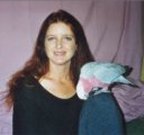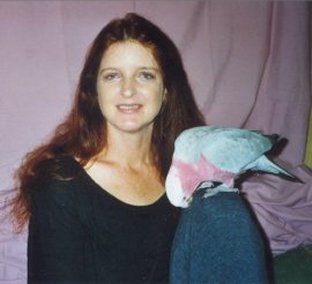AUSTRALIAN ARTISTS & WRITERS FOR THE WORLD
The World's in a mess. So, what can we do? by Liz Hall-Downs

[Above] Liz Hall-Downs and Alice by Kim Downs, 2001.
Liz Hall-Downs
|
I spent many of my early writing years railing at injustice - the injustice of the lack of loving intention in our behaviour towards others, the injustice of patriarchal systems that exclude women from full rights as equal citizens, the injustice that sees grain poured into the ocean to keep western markets buoyant while third world people starve to death, the injustice that places value on an individual's earning potential over his or her intrinsic human worth, or the injustice of Western governments' intervention in nations that continually abuse human rights only when those countries possess resources we desire for our own consumption. (I have no doubt there would have been no genocide in Rwanda if that country had been lucky - or cursed - enough to have vast oil resources ...). You can add your own examples to this list, as it's by no means exhaustive.
On a societal level, in the West it seems that those with money and resources are assumed to be 'good people', while those who have little are labeled 'untrustworthy', 'lazy', or 'welfare-dependant'. Yet I myself have experienced what it's like to be both at the top of the ladder, and on the bottom. It's from this latter perspective that one sees what welfare agencies have known for decades - that the poor will always give more of what they have than the rich. Possessing no innate sense of entitlement, the poor seem more able to empathise with those down on their luck, while the rich have too often bought into the capitalist lie that 'he who has, has because he is deserving'. Only a society that has made money its God could subscribe to such anti-human, narcissistic nonsense.
If anyone asked us, we'd all say we seek a better world - where all have enough to eat, clean water, and are free from war, needless pain and suffering. But when we dare to look at the world's realities head-on, it all too soon becomes overwhelming. 'What can one small person do?' we ask, despairingly. 'And how can I make any real difference?' For most of us, just keeping our own lives ticking over is an all-consuming task. So I would suggest that the best we can do as individuals is to choose a particular area to work within - one that gives back to society while enhancing our own sense of being a force for good rather than destruction.
For me, it all comes down to lifestyle. I realise I'm lucky to live in a country that has known prosperity and peace, and I look to those small things that bring joy to myself, as a human being, on an ordinary, everyday basis. For me, this is daily contact with the wild. I live on nine acres of dry schlerophyll forest in south-east Queensland, on a piece of land that farmers would consider 'useless' and developers would consider a 'gold mine', were it legally possible to subdivide. Every day I see and hear native birds and animals, who also call this small piece of land home. When I draw open the curtains in the morning, there are usually a number of red-necked wallabies and their joeys grazing on the native grasses.
When I stand on the veranda after dark, brush-tailed possums take a break from eating my pot plants to stare at me to see if I will be friend or foe. Goannas amble past in the warm afternoons; the descendants of the currawong nestling we raised several years ago drop by to beg breakfast; lorikeets wheel about in the sky, sulphur-crested cockatoos screech overhead, and scrub doves perform their mating dances. Every dawn and dusk, small birds splash about in the bird bath - grey fantails, rufous whistlers, yellow robins and Lewin's honeyeaters. Sometimes a blue fairy wren or its red-backed cousin drops in for a visit. To preserve this small paradise, all I need to do is leave it alone, refrain from clearing the trees, and put in a few occasional hours removing noxious weeds. In return, the earth gifts me with peace, tranquility, and a haven from the madness of the outside world.
I could lie in front of bulldozers on the front line of habitat destruction; or I could crusade in any number of other ways, all equally valid and commendable. But this is the small way I have chosen to influence the future, a way I know I can sustain, in the hope that, long after I'm gone, others will be able to walk here and see the things I see, hear the wind in the eucalypt trees, and marvel at the beauty and perfection of nature's diversity. For it is only by experiencing that we can know what, as a result of our over-consuming lifestyles, we risk losing forever. |
|
About the Writer Liz Hall-Downs

|
Liz has been reading and performing poetry in public, on TV and radio in Australia and the USA, and publishing in journals, since 1983. Liz also writes fiction and essays and works variously as a community artist, writer-in-residence, editor, singer, proof reader, and manuscript assessor of poetry, fiction and non-fiction. She holds a Bachelor of Arts degree from Deakin University (VIC) with major studies in Professional Writing & Literature and a Master of Arts in Creative Writing from the University of QLD. Her most recent collection is My Arthritic Heart (PostPressed, 2006). Previous collections include, Girl with Green Hair (Papyrus, 2000), Writers of the Storm: 5 East Coast Poets (Tyagarah consultants, Lismore, 1993), and Conscious Razing: Combustible Poems (1986). She is currently working on a realist novel, The Death of Jimi Hendrix, and singing and playing bush bass with the trio 'Cathouse Creek'. Liz lives in southeast Queensland on a Land for Wildlife property with her partner and a host of cheeky and very loveable parrots. |
[Above] Liz Hall-Downs and Alice by Kim Downs, 2001.
| |





